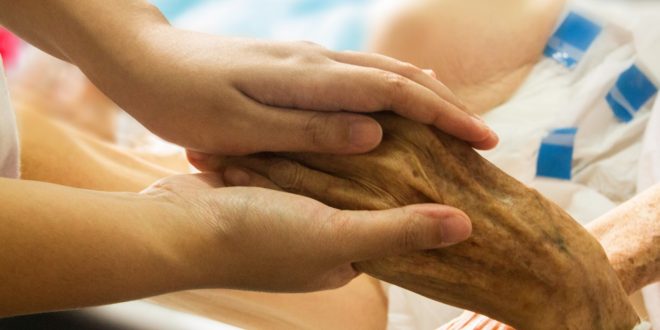
Recently I was asked a not so uncommon question by someone facing the loss of a loved one because of a terminal illness: How do you know when it’s the right time to call in Hospice?
For most of us, dealing with end-of-life decisions is never easy. In my work with grieving families over the years, I’ve watched the multitude of emotions patients and their loved ones display when faced with this difficult decision, including denial, anger, resistance, relief and peace, to name a few. There seems to be a common myth surrounding the very word “Hospice.” That is, if I call in Hospice, then I am giving up and there is no hope. This misconception keeps many patients and their families from receiving much-needed assistance in their last days to months of life.
As a general rule, Hospice can be called in when an individual, of any age, has been given a life expectancy of six months or less by a physician. This is not news anyone truly wants to hear. It often happens in an office or hospital setting, where nurses can make a difference when taking the time to help patients and their families to process this distressing information.
Patients and families should be encouraged to talk about what they have been told and openly discuss their feelings. Unfortunately, the possibility of dying or losing a loved one to death is not a comfortable topic and, for many, it is forbidden, either by the patient or a loved one. Another real problem is that not everyone agrees. Many variables come into play.
In an ideal world, we would openly discuss our wishes surrounding end-of-life care prior to having to deal with this issue. Those able to make the decision about their choices would have a living will in place, but more importantly, would discuss their wishes with their loved ones.
Unfortunately, this is not usually the case. So what is the answer to the question?
I encourage calling in Hospice as soon as possible. Hospice care is there to support individuals and their loved ones, providing needed help and a better quality of life during their last days to months. Far from giving up, Hospice can provide a team of experts such as a physician, nurses, certified nursing assistants, counselors, social workers, spiritual counselors and trained volunteers to assist during this most difficult time. Trained caregivers also provide follow-up care for those left behind to grieve.
At Jacksonville University’s Keigwin School of Nursing, we have a course called Celebration of Life, in which the nursing students explore death and dying and the process of grieving. During this course, we take a tour of one of our local Hospice settings and learn more about this process. It’s important that nurses who work with patients at the end of life be able to have those difficult conversations and support patients and their loved ones.
Below are two families who were able to benefit from Hospice care:
JOANNE
Joanne, at 64, was diagnosed with ovarian cancer and sought treatment. She took chemotherapy off and on for several years. She was loved and supported by her family.
Unfortunately, there came a time when the chemo was no longer helping. The suggestion was made to call in Hospice. Joanne was still alert, and able to discuss this option with her family. The husband was resistant, not wanting to give up on Joanne. The Hospice team spoke with the family, sharing what their role would be and how they could assist with Joanne’s comfort, as well as support the family. Reluctantly, her husband agreed.
The entire family came to love the Hospice nurse and the rest of the team. As Joanne’s pain was managed, questions were answered and spiritual assistance given, they were able to spend more quality time being together as a family and reminiscing about Joanne’s life. It was Christmastime and they sang carols and just sat quietly, being together.
Joanne made it through one last Christmas and died peacefully with her family at her side. The family so appreciated that her quality of life during her last month was enhanced by the care she received, and years later they still remember the loving compassion of the Hospice nurse.
MARTY
The diagnosis of lung cancer wasn’t such a surprise, as Marty, 56, had smoked since age 12. The surprise was that it had already metastasized to his brain. He endured several weeks of radiation following surgery to remove a tumor from his brain. He did fairly well for about a year, when he began stumbling and having severe pain to his right hip.
The prognosis was poor, as the cancer was now in his bone. The family did not want to call in Hospice as suggested, and was vehement that Marty could beat this, too. As his condition deteriorated further and he became bedridden, his physician again recommended Hospice, to which the family agreed.
The Hospice team came in, providing pain relief, assistance with hygiene several times a week, offering a trained volunteer to shop for groceries, and supporting Marty’s wife and grown children (who lived out of town and could only visit on weekends).
Marty died peacefully one week later in his recliner, with the nurse and many of his family members at his side. The family wished they had allowed the Hospice team to come in sooner, but were so thankful for the support they received.
Nursed to Health is an occasional feature in The Florida Times-Union in which Jacksonville University Keigwin School of Nursing faculty discuss symptoms, diagnoses and treatments based on actual and composites of patient cases handled by instructors, students and alumni of JU’s local training programs. Today’s column is by Dr. Pam Rillstone, who specializes in stress reduction and is professor of Nursing and psychiatric mental health coordinator for undergraduate studies in JU’s Brooks Rehabilitation College of Healthcare Sciences.
Names and specific medical information in Nursed to Health have been changed to protect private health information, and any similarity is coincidental. For more information about JU’s Keigwin School of Nursing, visit www.ju.edu/chs/nursing. Readers with specific questions regarding their own health concerns should seek the advice of their healthcare provider.
 Wave Magazine Online Jacksonville University News Hub
Wave Magazine Online Jacksonville University News Hub
